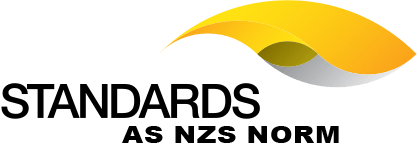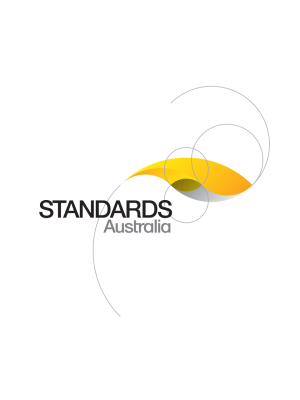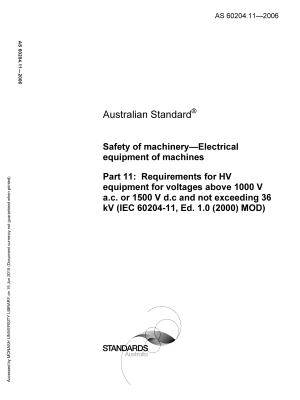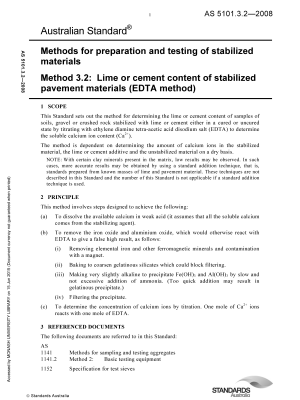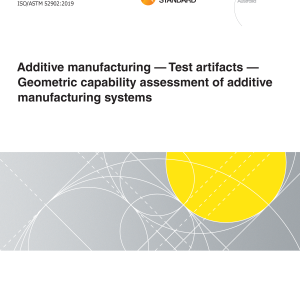🔍

Purchase the full subscription package now and enjoy a 40% discount, along with free updates for future editions.
AS ISO/ASTM 52902:2021
$142.09
Additive manufacturing – Test artifacts – Geometric capability assessment of additive manufacturing systems
Identically adopts ISO/ASTM 52902:2019, which cover the general description of benchmarking test piece geometries along with quantitative and qualitative measurements to be taken on the benchmarking test piece(s) to assess the performance of additive manufacturing (AM) systems .
Table of contents
Header
About this publication
Preface
Foreword
1 Scope
2 Normative references
3 Terms and definitions
4 Significance and use
4.1 General
4.2 Comparing results from one machine
5 General principles for producing artifacts
5.1 General
5.2 Need to use feedstock conforming to a material specification
5.3 Need to undertake artifact building according to a documented process specification
5.4 File formats and preparation
5.5 Download files
5.6 Discussion of file conversion
5.7 AMF preferred (with conversion instructions/ resolutions)
5.8 Need for test specification and test process
5.9 Quantity of test artifacts
5.10 Position and orientation of test artifacts
5.11 Considerations for orientation
5.12 Labelling
5.13 Coverage
5.14 Arrays
5.15 Part consolidation
5.16 Supports and post processing
6 General principles for measuring artifacts
6.1 General
6.2 Measure parts as built
6.3 Measurement strategy
6.4 Measurement uncertainty
7 Artifact geometries
7.1 General
7.2 Accuracy
7.2.1 Linear artifact
7.2.1.1 Purpose
7.2.1.2 Geometry
7.2.1.3 Measurement
7.2.1.4 Considerations
7.2.2 Circular artifact
7.2.2.1 Purpose
7.2.2.2 Geometry
7.2.2.2.1 Basic geometry
7.2.2.2.2 Base
7.2.2.2.3 Outer rings
7.2.2.2.4 Inner rings
7.2.2.3 Measurement
7.2.2.4 Considerations for producing test artifacts
7.2.2.5 Reporting
7.3 Resolution
7.3.1 Resolution pins
7.3.1.1 Purpose
7.3.1.2 Geometry
7.3.1.3 Measurement
7.3.1.4 Considerations
7.3.2 Resolution holes
7.3.2.1 Purpose
7.3.2.2 Geometry
7.3.2.3 Measurement
7.3.2.4 Considerations
7.3.3 Resolution rib
7.3.3.1 Purpose
7.3.3.2 Geometry
7.3.3.3 Measurement
7.3.3.4 Considerations
7.3.4 Resolution slot
7.3.4.1 Purpose
7.3.4.2 Geometry
7.3.4.3 Measurement
7.3.4.4 Considerations
7.4 Surface texture
7.4.1 Purpose
7.4.2 Geometry
7.4.3 Measurement
7.4.4 Reporting
7.4.5 Considerations
7.4.5.1 Build orientation
7.4.5.2 Repeatability
7.4.5.3 Supports
7.4.5.4 Recoater
7.5 Labelling
7.5.1 Purpose
7.5.2 Geometry
7.5.3 Considerations
Annex A
Annex B
B.1 General
B.2 Suggestions for dimensional measurement
Annex C
C.1 General
C.2 Linear artifact
C.2.1 Equipment for measurement
C.2.2 Instructions for benchmark measurement
C.2.3 Considerations for measuring benchmark
C.3 Circular artifact
C.3.1 Equipment for measurement
C.3.2 Instructions for benchmark measurement
C.4 Resolution pins
C.4.1 Equipment for measurement
C.4.2 Instructions for benchmark measurement
C.4.3 Considerations for measuring benchmark
C.5 Resolution holes
C.5.1 Equipment for measurement
C.5.2 Instructions for benchmark measurement
C.5.3 Considerations for measuring benchmark
C.6 Resolution ribs
C.6.1 Equipment for measurement
C.6.2 Instructions for benchmark measurement
C.6.3 Considerations for measuring benchmark
C.7 Resolution slots
C.7.1 Equipment for measurement
C.7.2 Instructions for benchmark measurement
C.7.3 Considerations for measuring benchmark
C.8 Surface texture
C.8.1 Equipment for measurement
C.8.2 Instructions for benchmark measurement
Annex D
Bibliography
Cited references in this standard
Content history
[Current]
[Superseded]
DR AS ISO/ASTM 52902:2021
Please select a variation to view its description.
| Published | 21/05/2021 |
|---|---|
| Pages | 36 |
Please select a variation to view its pdf.
